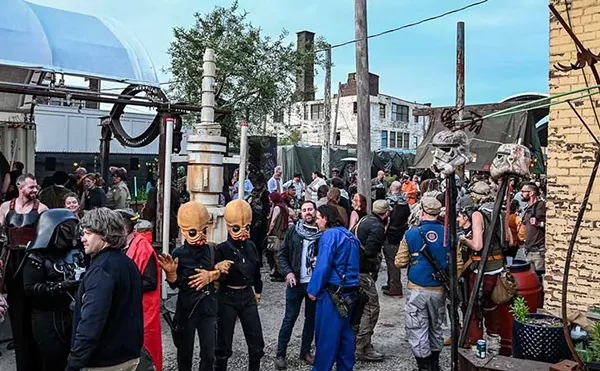
Audio By Carbonatix
[
{
"name": "GPT - Leaderboard - Inline - Content",
"component": "35519556",
"insertPoint": "5th",
"startingPoint": "3",
"requiredCountToDisplay": "3",
"maxInsertions": 100,
"adList": [
{
"adPreset": "LeaderboardInline"
}
]
}
]
Unlike other rising young literary stars, Neal Pollack doesn't turn mundane life into celebrated fiction through the writer's usual write-what-he-knows procedure. He casts himself as the man's man literary heavyweight "Neal Pollack," invents unbelievable versions of familiar stories, situations, and scenes, and presents them in the kind of pompous prose that celebrity writers supply to glossy magazines. But the mock articles are so brazenly exaggerated that it's impossible not to believe they're bogus.
A former reporter for the alternative weekly Chicago Reader, the now 32-year-old Pollack spent seven years covering the urban beats in which alt-weeklies traffic. But it wasn't his gritty investigative work that established his reputation. It was a series of posts on the Web site of Dave Eggers' semiregular journal Timothy McSweeney's Quarterly Concern, in which Pollack penned fake features in high Magazine Style — such as "Things I Did in Denver," a report from the 2000 Green Party convention, and the lifestyle piece "A Report on the Habits of the Sexually Ravenous Single Women of New York, Who Also Have Jobs." Collected, they became the first offering from Eggers' literary imprint, McSweeney's Books, 2000's The Neal Pollack Anthology of American Literature.
Shortly after the Anthology's release, Pollack went from writing in alt weeklies to being written about in The New York Times Book Review. Now he has a book deal with HarperCollins, was named a "writer to watch" in the January / February 2002 issue of Book magazine, has an album out on Chicago-based alt-country label Bloodshot Records with the Pine Valley Cosmonauts, and is jetting across the country on a six-week book tour (with a stop at Ann Arbor's Del Rio on April 9). Not bad for a guy whose literary tool kit consists of an average liberal arts graduate's acquaintance with contemporary American letters, and an unmistakable knack for making shit up.
But the "Neal Pollack" that made Neal Pollack famous is nothing like the real Pollack, even though he slides effortlessly between the two. He answers the hotel phone during the Chicago stop of his book tour like a puckish parvenu. "Neal Pollack's luxurious suite," he says, his voice at once distinctively American but absent of any accent that places his regional origin. This anonymity bolstered his literary enterprise. Starting out, nobody permitted Pollack to be anybody. For a while, he was even believed to be Eggers writing under a pseudonym, until Pollack's own mother wrote to the San Diego Union-Tribune to vouch for his existence. Being an anonymous anybody is exactly what frees Neal Pollack to proclaim himself the "greatest living writer of his generation" — and to write in the overbearing first person, in an endless amalgamation of most every big-name 20th-century writer's biography and his (almost invariably his) style.
But Pollack has practically joined that inner sanctum he roasted. His first book was promoted with a Jacqueline Susann-like personality-driven publicity tour, financed out of his own pocket. With the paperback Anthology (including additional material) coming out this month, he's tooling around the country again — only this time it's on HarperCollins' dime.
The tour also coincides with the release of his Bloodshot album, The Neal Pollack Anthology of American Literature. Where the print version of the Anthology can be read as a lampoon of the Modern Library edition of classic books, the album takes Harry Smith's Anthology of American Folk Music as its object of admiration-qua-satire.
Smith's 1952 triple-LP Anthology was an eclectic compendium of early American folk music organized and presented through Smith's peculiar world view: Liner notes were written like newspaper bulletins, and the artwork was heavily informed by Smith's interest in Gnostic and occult motifs.
Pollack's single CD mimics Smith's box set in aesthetic and sound — the music performed by Mekons mainstays Jon Langford and Sally Timms, Bloodshot chanteuse Kelly Hogan, and others is a grab bag of folk styles and recorded with a hiss that recalls old records. Instead of murder ballads and spirituals and other folk forms, however, Pollack reinterprets pieces from his Anthology, such as "I Am Friends With a Working-Class Black Woman," as spoken-word narratives.
Having a two-front media presence gives Pollack more ammunition for his arsenal of self-promotions. "Book tours are boring," he says. "If I'm going to be doing this for six weeks, I want it to be fun. I can be a Norman Mailer-like literary figure or I can be a fake rock star. I can make it whatever I want to make it. There is no one consistent joke. All I'm trying to do is put on a good show when I make public appearances. And whatever it takes to put on a good show is what I do. And I veer in and out of whatever kind of character I need to."
Pollack studied improv under the late Del Close — the guru to such Second City and ImprovOlympic alumni as John Belushi, Mike Myers, and Chris Farley — and though Pollack confesses that he wasn't Close's star pupil, Close's methods suit his current endeavor. "Improv trained me to prepare for whatever situation arises," he says. "I can pretty much answer any kind of question in any kind of way. I look at this [tour] as a six-week vacation where I don't have to pay for anything and I get to do interviews. And I'm going to have a goddamned good time while I'm doing it."
That bravado doesn't come off as over-inflated ego, but rather the swagger of a young writer in full command of his persona. Like many McSweeney's personalities, Pollack's smirking alter ego is adept with no-brow pop culture and tony capital "L" Literature. The arch tone isn't for every reader. When the (in)famous Pollack writes in "Things I Did in Denver" that "[a]longside me stood Bill Thomas, a local simpleton I had hired for the day to carry my writing implements and bottled water," it may sound like mere smugness, rather than a dart thrown at Sebastian Junger.
But, as independent music did in the mid- to late 1980s, McSweeney's has staged a minor coup riding on the shoulders, minds, and pocketbooks of a niche audience. That market share may be narrow: generally young, white, middle-class, college-educated, and somewhat politically liberal. Still, McSweeney's Books made enough of a cubby hole for itself that larger publishing houses took notice — even if the in-jokes may be lost on the broad, lucrative middle of the book-buying public.
What McSweeney's clever authors can do after their flashy debuts, however, remains to be seen, and Pollack may be the first to find out. HarperCollins has bought the rights to Pollack's first novel proper, My Life in Rock. With it, he's taking a stab at something that nobody has quite perfected: the rock 'n' roll novel. Others have tried — see Tom Carson's Twisted Kicks, Lewis Shiner's Glimpses: A Novel, or Salman Rushdie's The Ground Beneath Her Feet — but they've all been relatively listless works.
My Life in Rock presents a fictitious, satirical history of rock 'n' roll told from the point of view of two rival rock critics. "I've written maybe a quarter of it," Pollack says. "It traces rock from the beginnings in the late '40s until its death in 1994. Of course, rock 'n' roll didn't die in 1994, but rock critics say it did. So that's the joke. [But] it's still a novel, so within that you have room to explore other concerns. It's not like there's a blow-job joke on every page. It's more like every other page."
Pollack also hopes to release an album with Rock as well. "My Life in Rock contains a number of original songs," he says. "And I hope to record the songs in the book. And why not? Why not have a book and an album come out simultaneously?"
Again, that hubris comes uncomfortably close to embracing the celebrity mind-set he caricatures, á la Robert James Waller's The Ballads of Madison County or Dave Barry, Stephen King, and Amy Tan's band the Rock Bottom Remainders. But lurking beneath Pollack's ambition is his familiar sardonic streak.
"Well, you know, I'm real," he says. "I could be like J-Lo and Howard Stern all rolled into one slightly more talented package."
Neal Pollack's tour stops at the Del Rio in Ann Arbor (122 W. Washington) Tuesday, April 9 at 7 p.m. Local singer-songwriter Jim Roll also performs.
Bret McCabe writes for City Paper, where the original version of this feature appeared. Send comments to letters@metrotimes.com




